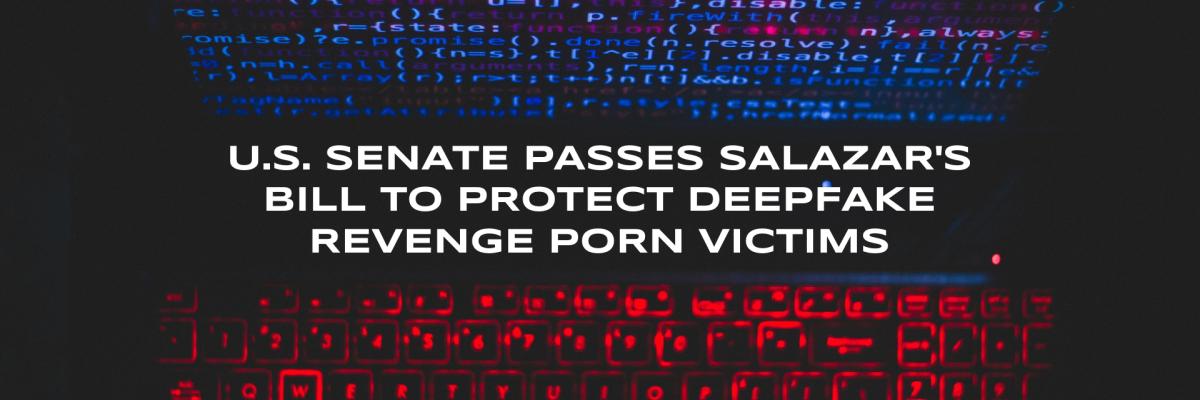U.S. Senate Passes Salazar’s Bill to Protect Deepfake Revenge Porn Victims

WASHINGTON, D.C. – The U.S. Senate unanimously passed S. 4569, the companion version to Reps. María Elvira Salazar (R-FL) and Madeleine Dean’s (D-PA) TAKE IT DOWN Act (H.R. 8989). The TAKE IT DOWN Act protects victims of real and deepfake ‘revenge pornography,’ a crime that is increasingly and rapidly affecting our nation’s youth. Senators Ted Cruz (R-TX) and Amy Klobuchar (D-MN) led a large bipartisan coalition of senators in introducing and passing the Senate version of this bill.
The growth in non-consensual intimate imagery (NCII), more commonly known as ‘revenge porn,’ following the rising popularity of AI, requires decisive legal protections that will empower victims, most of whom are women and girls. The TAKE IT DOWN Act criminalizes the publication of these harmful images and requires websites to quickly remove them.
“By voting for the TAKE IT DOWN Act, the Senate took a stand to protect women and girls victimized by bad actors stealing their likenesses to create fake revenge porn,” said Rep. María Elvira Salazar. “To my colleagues in the House of Representatives – let’s join the Senate and pass this bill to protect these innocent victims NOW!”
Representative Salazar is one of Congress’ leading voices on protecting the right of Americans to their voices and likenesses against the abuses of AI, as well as their ability to go after criminals who abuse those rights for personal gain.
“The Senate’s passage of the TAKE IT DOWN Act is a significant step forward in Congress’ responsibility to swiftly regulate some of the most harmful developments of AI — and urgently defend victims and survivors of exploitative deepfakes and non-consensual intimate imagery. We must defend victims and ensure these images are removed from the Internet. I am eager to work with Congresswoman Salazar to tackle these critical issues,” said Rep. Madeleine Dean.
“Over the past several months, courageous victims of AI-deepfake ‘revenge porn’ have shared their stories to raise awareness and inform lawmakers’ efforts to stop this despicable behavior. Passage of our bipartisan TAKE IT DOWN Act will give innocent victims — many of whom are teenage girls —the opportunity to seek justice against deviants who publish these abusive images. It will also hold Big Tech accountable by making sure websites remove these disgusting fake videos and pictures immediately. For young victims and their parents, these deepfakes are a matter requiring urgent attention and protection in law. I will continue to work with my colleagues in Washington to move this common-sense bipartisan legislation quickly through the House and to the President’s desk so it can be signed into law,” said Senator Ted Cruz.
“We must provide victims of online abuse with the legal protections they need when intimate images are shared without their consent, especially now that deepfakes are creating horrifying new opportunities for abuse. This bipartisan legislation builds on my work to ensure that victims can have this material removed from social media platforms and will ensure law enforcement can hold perpetrators accountable,” said Senator Amy Klobuchar.
BACKGROUND:
The TAKE IT DOWN Act solves the problem of inconsistent, or non-existent, legislation protecting victims of deepfake pornographic images at the state level. While nearly all states have laws protecting their citizens from revenge porn, only 20 states have explicit laws covering deepfake non-consensual intimate imagery (NCII). Within those 20 states, there is a high degree of variance in classification of crime, penalty, and even criminal prosecution. Victims also struggle to have images depicting them removed from websites in a timely manner, potentially contributing to more spread and retraumatization.
In 2022, Congress passed legislation creating a civil cause of action for victims to sue individuals responsible for publishing NCII. However, bringing a civil action can be incredibly impractical. It is time-consuming, expensive, and may force victims to relive trauma. Further exacerbating the problem, it is not always clear who is responsible for publishing the NCII.
The TAKE IT Down Act addresses these issues while protecting lawful speech by:
- Criminalizing the publication of NCII or the threat to publish NCII in interstate commerce;
- Protecting good faith efforts to assist victims by permitting the good faith disclosure of NCII for the purpose of law enforcement or medical treatment;
- Requiring websites to take down NCII upon notice from the victims within 48 hours; and
- Requiring that computer-generated NCII meet a ‘reasonable person’ test for appearing to realistically depict an individual, so as to conform to current First Amendment jurisprudence.
###